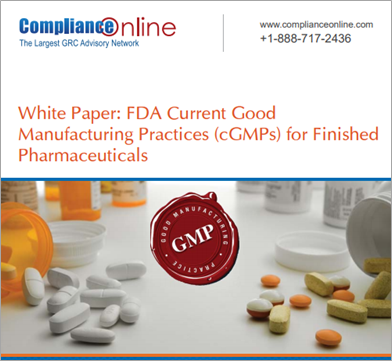3 Common Violations of Current Good Manufacturing Practice (CGMP) Regulations for Finished Pharmaceuticals and How to Prevent Them
- Organization and Personnel
- Buildings and Facilities
- Equipment
- Control of Components and Drug Product Containers and Closures
- Production and Process Controls
- Holding and Distribution
- Laboratory Controls
- Records and Reports
- Returned and Salvaged Drug Products
- Failure to conduct tests to verify the identity of each component of a drug product
The regulations
'The CGMP regulations address component sampling and testing primarily at 21 CFR 211.84. These regulations require representative samples of each shipment of each lot of active and inactive component (or raw materials) to be tested to confirm the identity of the component as labeled prior to release for use in drug product manufacturing. The regulations acknowledge that more than one test may be needed to ascertain a component's identity.'
The inspection
During an inspection, the FDA inspector may request records pertaining to the identity testing of incoming component ingredients. Hence it is important that you maintain records of adequate testing of the identity of incoming components used in the manufacture of your drug products before their release and distribution. Keep in mind that the FDA will not pass your audit if you simply conduct identity testing of active ingredients by evaluating a batch or group of suppliers by collecting samples. Neither will the FDA accept if the identification tests are done based on a sensory evaluation.
- Failure to perform, for each batch of drug product, appropriate laboratory determination of satisfactory conformance to final specifications for the drug product, including the identity and strength of each active ingredient, prior to release.
The regulations
21 CFR 211.165(a): For each batch of drug product, there shall be appropriate laboratory determination of satisfactory conformance to final specifications for the drug product, including the identity and strength of each active ingredient, prior to release. Where sterility and/or pyrogen testing are conducted on specific batches of shortlived radiopharmaceuticals, such batches may be released prior to completion of sterility and/or pyrogen testing, provided such testing is completed as soon as possible.
The inspection
During the inspection, the inspectors may review your import records. To pass the audit and prevent warning letters, be sure that you have adequately performed full release testing including strength and identity testing of the active ingredient of your finished products before release.
- Failure to use equipment in the manufacture, processing, packing, or holding of drug products that is of appropriate design, adequate size, and suitably located to facilitate operations for its intended use and for its cleaning and maintenance
The regulations
21 CFR 211.63: 'Equipment used in the manufacture, processing, packing, or holding of a drug product shall be of appropriate design, adequate size, and suitably located to facilitate operations for its intended use and for its cleaning and 'maintenance'.
The Inspection
During the inspection, the inspector may request for records that prove your manufacturing equipment are appropriate for the intended use and consistently operate during the manufacturing of your product. You may be asked to provide proof of your equipment qualification program. Be sure you have documented your installation and operation qualification for your manufacturing equipment. You must also have information of your recent calibration information for your equipment.
- 21CFR211.25(a) requires employees to attend training, including GMP, specific to their job responsibility.
- ICH Q7, Good Manufacturing Practice Guide for Active Pharmaceutical Ingredients, Section 3.12 also requires personnel to attend GMP training relevant to their functions.
- Joint IPEC-PQG Good Manufacturing Practices Guide for Pharmaceutical Excipients requires site staff training suitable to their job responsibility.
- Annual Current Good Manufacturing Practices (cGMP) Training
- Bringing FDA Pharmaceutical GMPs into the 21st Century
- CGMP Controlled Raw Materials
One of the frequently cited FDA inspectional observations for finished pharmaceuticals includes violations of Current Good Manufacturing Practice.
CGMP refers to the Current Good Manufacturing Practice regulations enforced by the FDA. CGMPs provide for systems that assure proper design, monitoring, and control of manufacturing processes and facilities.

Adherence to the CGMP regulations assures the identity, strength, quality, and purity of drug products by requiring that manufacturers of medications adequately control manufacturing operations.
This includes establishing strong quality management systems, obtaining appropriate quality raw materials, establishing robust operating procedures, detecting and investigating product quality deviations, and maintaining reliable testing laboratories.
This formal system of controls at a pharmaceutical company, if adequately put into practice, helps to prevent instances of contamination, mix-ups, deviations, failures, and errors. This assures that drug products meet their quality standards.'
21 CFR Part 210 provides the meanings of terms used in the regulations. 21 CFR Part 211 details the current good manufacture practice for finished pharmaceuticals. It covers requirements for:
3 Common CGMPs Violations
Preventing CGMP Violations
Real-world examples of FDA warning letters can help you prepare for audits, prevent CGMP violations and see theory in practice. Here are some examples of CGMP violations for finished pharmaceuticals.
Warning letter Haw Par Healthcare Limited
Warning letter Jiangmen Nowadays Daily Goods Co., Ltd.
Warning letter Dibar Nutricional S. de R.L. de C.V.
Learn from CGMP Training and Courses
Training in Good Manufacturing Practices (GMPs) is a regulatory requirement
If you would like to attend a CGMP training, here are some courses:
Learn from Free Resources
ComplianceOnline's free resources can help you get the fundamentals of CGMP aright. You may also wish to download the whitepaper FDA Current Good Manufacturing Practices (cGMPs) for Finished Pharmaceuticals







